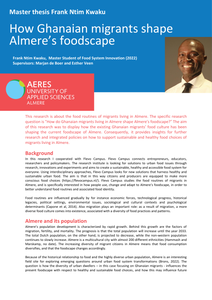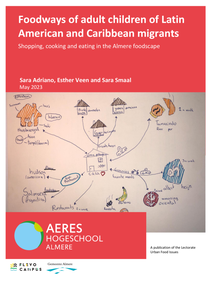This research is about the food routines of migrants living in Almere. The specific research question is “How do Ghanaian migrants living in Almere shape Almere’s foodscape?” The aim of this research was to display how the existing Ghanaian migrants’ food culture has been shaping the current foodscape of Almere. Consequently, it provides insights for further research and integrated policies on how to support sustainable and healthy food choices of migrants living in Almere.
DOCUMENT

The influx of migrants in Western Europe raises questions about the potential of leisure spaces and activities to support processes of social inclusion and to allow migrants to develop a sense of belonging. Discussions are ongoing about how this potential is realised or not. In this paper, I propose that the perspective of leisure activities as ritual may help to untangle how leisure spaces and practices build solidarity and a sense of belonging. The paper draws on interviews with Polish migrants to the Netherlands about leisure activities they undertake. Specifically, the paper will examine dance clubs as spaces and going out as activity in which migrants enter into contact with locals. It will show how these spaces and activities ultimately fail as potential sites for developing a sense of belonging.
LINK
This paper examines travel by western migrants who have moved to the Hong Kong or Macau Special Administrative Regions of China. Previous research suggests travel patterns are a form of learned behaviour. New migrants initially exhibit patterns learned from their home countries, but over time their patterns change and reflect more those of residents of their new countries as they learn and adopt new behaviours. This situation was not observed among western migrants. Instead, they exhibited patterns that were internally consistent, regardless of the migrant's origin, but different from those of the local Chinese populace. The paper argues that western migrants, who generally live in a parallel expatriate bubble to those host community, have learned travel patterns from others who also live in that bubble
LINK
The research sets out to explore what adult children of migrants consider to be their eating culture and food identity. We do so by looking at how they shop, cook, and eat on a daily basis and what foods they feel connected to. A secondary goal of this research is to understand how important sustainable food is for this group. For this report, we invited adult children of migrants, who grew up in Almere to share their stories. Being born in the Netherlands with parents who were born abroad – in our case Latin-America and the Caribbean – children of migrants grow up in two different food environments simultaneously. Outside the home, they are surrounded by a Dutch food environment, while the eating patterns in and around their household or wider family setting may reflect the backgrounds of their parents.
DOCUMENT

This study links self-concept and place attachment to generate a better understanding of travel behavior patterns by migrant populations, in this case, Western professional migrants who live in the Hong Kong and Macau Special Administrative Regions of China. Five discrete Western professional migrant groups are identified, each with different demographic profiles, travel patterns, propensity, and intensity. The findings challenge the view that migrant populations are homogenous and also challenge the widely held notion that home return travel is their dominant mobility pattern. Conceptual and managerial implications of migrant travel behavior for destination marketers are briefly outlined.
LINK
In this booklet, the focus is on the stories of three Polish men in The Hague. The researcher, Karijn Nijhoff, has followed these men extensively and has recorded their migration stories in detail. We can read about their arrival, their experiences, their travels. We see a process of temporary and continuous, varied labor market participation. We can see a reality of different shades of gray. Integration, as defined by policy makers, can be a whole different process than the official descriptions prescribe. Er is ook een Nederlandse vertaling van dit rapport in deze database: "Tussen de mazen van het net".
DOCUMENT

Professional interventions are rarely successful when used to “normalize” the behaviour of a disruptive group of Dutch-Caribbean migrants. Surprisingly a large number of professionals have not succeeded in assimilating a relatively small group. Foucault developed a means of analysing power mechanisms, which is essential to understanding how non-conformist groups are turned into “normal” subjects. If, following Foucault, we conceive of professional interventions as power strategies, we may wonder what might undermine their effectiveness. This is part of a broader research question which asks whether Foucault’s description of normalizing power offers sufficient means to describe power strategies as reciprocal interaction. My thesis is that the concept “logics”, as used by Mol, offers tools that are a useful addition to Foucault’s theory. The ways in which Dutch professionals view problematic Dutch-Caribbean migrants and the interventions they use can be described as different logics.This enables us to recognize the similarities and frictions between different practices.
DOCUMENT

As migrant populations age, the care system is confronted with the question how to respond to care needs of an increasingly diverse population of older adults. We used qualitative intersectional analysis to examine differential preferences and experiences with care at the end of life of twenty-five patients and their relatives from Suriname, Morocco and Turkey living in The Netherlands. Our analysis focused on the question how–in light of impairment–ethnicity, religion and gender intersect to create differences in social position that shape preferences and experiences related to three main themes: place of care at the end of life; discussing prognosis, advance care, and end-of-life care; and, end-of-life decision-making. Our findings show that belonging to an ethnic or religious minority brings forth concerns about responsive care. In the nursing home, patients’ minority position and the interplay thereof with gender make it difficult for female patients to request and receive responsive care. Patients with a strong religious affiliation prefer to discuss diagnosis but not prognosis. These preferences are at interplay with factors related to socioeconomic status. The oversight of this variance hampers responsive care for patients and relatives. Preferences for discussion of medical aspects of care are subject to functional impairment and faith. Personal values and goals often remain unexpressed. Lastly, preferences regarding medical end-of-life decisions are foremost subject to religious affiliation and associated moral values. Respondents’ impairment and limited Dutch language proficiency requires their children to be involved in decision-making. Intersecting gendered care roles determine that mostly daughters are involved. Considering the interplay of aspects of social identity and their effect on social positioning, and pro-active enquiry into values, goals and preferences for end-of-life care of patients and their relatives are paramount to achieve person centred and family-oriented care responsive to the needs of diverse communities.
DOCUMENT

Background: Despite high prevalence of mental problems among elderly migrants in The Netherlands, the use of psychosocial care services by this group is low. Scientific evidence points at the crucial role of social support for mental health and the use of psychosocial services. We therefore explored the role of social networks in the access to psychosocial care among elderly migrants in The Netherlands. Methods: A qualitative study was conducted using semi-structured group interviews and individual interviews. The eight group and eleven individual interviews (respectively n = 58 and n = 11) were conducted in The Netherlands with Turkish, Moroccan, Surinamese, and Dutch elderly. The data were analysed through coding and comparing fragments and recognizing patterns. Results: Support of the social network is important to navigate to psychosocial care and is most frequently provided by children. However, the social network of elderly migrants is generally not able to meet the needs of the elderly. This is mostly due to poor mental health literacy of the social network, taboo, and stigma around mental illness and the busy lives of the social network members. Conclusions: Strategies to address help-seeking barriers should consider mental health literacy in elderly migrants as well as their social networks, and counteract taboos and stigma of mental health problems.
LINK
This paper reports on the collective ideas of the occupational scientists and therapists who attended the “Refugees – Addressing Key Social Issues” think tank at the Occupational Science Conference held in Hildesheim (2017). Forced migration is recognized as a prevalent issue in today’s society. Forced migrants face many occupational challenges, which are being exacerbated by restrictive migration policies. This paper outlines the discussions held during the think tank and presents an occupational perspective of forced migrants’ needs, followed by a desired vision of what an occupationally just world would look like for forced migrants, and future directions to guide occupation-based social transformation.
DOCUMENT